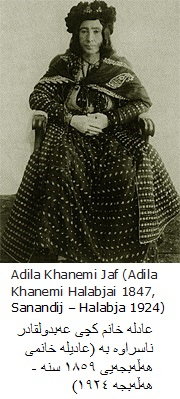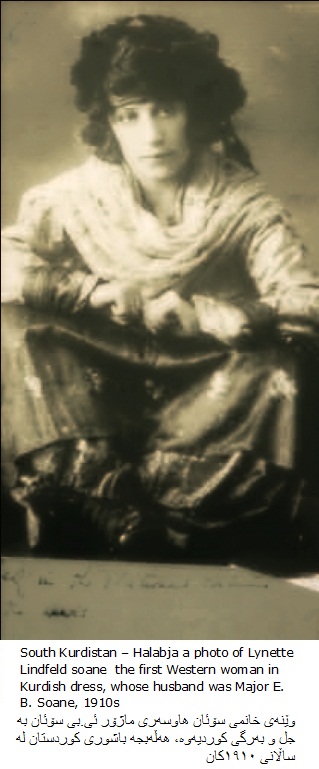خانمی وسمان پاشا (عادیله خانم)
ئافرهتی كارگێری خێڵی گهوره و گرانی جاف، خاتووعادیلە خانم ساڵی ١٨٥٩ لە شاری سنە ی پایتهختی ئهردهڵان لە رۆژھەڵتی کوردستان له دایكبووه و له ناو گهوره و سهردارهكانی ئهردهڵان چاوی كراوهتهوه، ژنێکی دەسەڵاتدارو کارگێڕی ھۆزی جافو ھاوسەری عوسمان پاشای جافو کچی عەبدولقادر بەگی ساحێبقڕانو دایکی ئەحمەد موختار جافو تاھیر بەگی جاف دوو شاعیری ناودار بووە، لە رۆژگاری خۆی دا ئینگلیزەکان پێیانوتووە شاژنی بێ تاجی شارەزوور. بنەماڵەی عادیلە خانم لەدوای تێکچوونی فەرمانڕەوایی میرنشینی بابان لە ساڵی ١٨٥١ دا لە شاری سلێمانی-یەوە چوونەتە خاکی ئەردەڵانو.
ئهو ئافرهته تێگهیشتووه له ساڵی ١٨٩٥دا شووی به وهسمان پاشای جاف كردووه له ههڵهبجه . دایكی دڵسۆزی "ئهحمهد موختار جاف"ی شاعیری ناوداری كورد بووه، ئهو ڕۆڵهیهی به جۆرێكی وا پهروهرده كردووه كه له دوا ڕۆژدا ببێته ڕابهری كۆمهڵگاكهی و دڵسۆزی نیشتمانهكهی. له دوای مهحموود پاشای جاف، سهرۆكایهتی ئهو هۆزه مهزنهی كورد، هۆزی جاف دهكهوێته ئهستۆی وهسمان پاشای مێردی عادیله خانم. ئهو ئافرهته لێهاتووه هۆشیاره دهبێته یارمهتیدهرێكی كارای هاوسهرهكهی و كه وهسمان پاشا زیاتر دهچێته ناو ساڵانهوه کە عوسمان پاشا پیردەبێتو ھەروەھا لەدوای مردنیشی لەساڵی ١٩٠٥ دا،عادیله خانم ههموو كاروباری هۆزی جاف سهركهوتوونه بهڕێوه دهبات و ناوبانگی له ههموو ناوچهی شارهزوور و ههورامان و شوێنهكانی دیكهی كوردستانی باشوور بڵاودهبێتهوه و ڕێزێكی زۆری نهك ههر له ناو خێڵهكانی دیوی كوردستانی ڕۆژههڵاتیش دهبێ و فهرمانی جێبهجێ دهكرێ و، ههموو كێشهیهكی كارگێڕی و كۆمهڵایهتیشیله دوای كۆچی دوایی وهسمان پاشا چارهسهر دهكرد و بهندیخانهی تایبهتی دروست كردبوو بۆ بهند كردنی ئهو تاوانبارانهی كه فهرمانی بهسهردا دهدان. ئهو ئافرهته مهزنه زۆر حهزی به ئاوهدانی و پێشخستنی زانست و خوێندهواری دهكرد. قوتابخانه و بازاڕێك و چهند باڵهخانهی گهورهی له ههڵهبجه بنیات ناو له گوندێكی بچووكهوه كردیه شارێكی ئاوهدانی به هات و بات و گهلێك باخ و سهیرانگای جوان و دڵگیری لێ دروست كرد. به كورتی عادیله خانم ژیانێكی شارستانی لهو شاره خنجیلایهدا پێكهوهنا وهك ئافرهتێكی به دهسهڵات و فهرمانڕهوا لهو ناوچهیه و له ناو هۆزهكهی خۆیدا ژیا تاكو له تهمهنی ٦٥ ساڵیدا له ١٧ی مانگی تەمموز لهو شارهی ههڵهبجه له ساڵی١٩٢٤دا كۆچی دواییكرد و له گۆڕستانی "عهبابهیلێ"ی نزیك ههڵهبجه به گۆڕی تاھیر بەگی کوڕیەوە نێژرا، پاشان ئەحمەد موختار بەگی کوڕیشی لە پاش شەھیدبوونی نزیک بەوان بەخاک سپێردرا و سڵاو له یادی كۆچی دوایی ئهم شێره ژنهی كورد. کاتێک ئینگلیزهکان سلێمانییان له ساڵی ١٩١٩داگیرکردووه، ههر دوو کوڕهکهی خانمی وسمان پاشا (ئهحمهد موختار جاف و عیزهت بهگ) به پیر ئینگلیزهکانهوه چوون و له پاداشتی ئهمهدا ئینگلیزهکان خۆیان سهردانی ههڵهبجهیان کردووه، چوونهته خزمهت خانمی وسمان پاشا و سوپاسیان کردووه.
مینۆرسکی ئاماژەی بەدیتنی خانم لە ھەڵەبجە (لە ساڵی ١٩١٤دا) کردووەو بەفەرمانڕەوای ڕاستەقینەی ھەڵەبجەی، لە پێشو پاش مردنی مێردەکەی داناوە، ھەروەھا ستایشی سەخاوەتو میوانداریی ئەو ژنە کوردەی کردووە. مێجەر سۆن کە بەشێوەی بازرگانێکی فارسیو بەناوی "غولام حوسێن شیرازی"یەوە ساڵی ١٩٠٩ سەردانی ھەڵەبجەی کردووەو پتر لە شەش مانگ لە ماڵی خودی وەسمان پاشا دا، نزیك لە عادیلە خانو تاھیر بەگی کوڕی دا، ماوەتەوە، بیرەوەرییو باسێکی گرنگی لەوبارەیەوە لە کتێبە ناودارەکەی (گەشتنامە) دا تۆمارکردووە.
Adila Khanemi Jaf (Adila Khanemi Halabjai 1847, Sanandij – 1924)
Lady Adela Jaf or Adela Khanem,
called the Princess of the Brave
by the British, an Kurdish ruler
and of the Jaf tribe; one of the
first famous woman leaders in
the history of Kurdistan. Jaf
tribe, the biggest tribe in
Kurdistan, native to the Zagros
area, which is divided between
Iran and Iraq. Adela Khanem was
of the famous aristocratic
Sahibqeran family, who
intermarried with the tribal
chiefs of Jaf.[1] Lady Adela
exerted great influence in the
affairs of Jaf tribe in the
Sharazor plain. She was born in
1847 the ruling family in
Sanandaj, second largest city of
Iranian Kurdistan. She married
Kurdish King Osman Pasha Jaf,
whose headquarters was in
Halabja. Her husband Osman Pasha
Jaf, was a Pasha and she ruled
in his place at her husband’s
absence. Her father was the
grand visir of Persia and her
uncles were grand visirs of the
Ottoman Empire and Saudi Arabia.
Adela Jaf was one of the few
rulers that were women in the
region. The British invaded
German Ottoman Iraq during World
War I and conquered it with the
treaty of Mudros in 1917. They
wished to give the Kurds
Autonomy by setting up the Mosul
commission in 1918. They gave
Mahmud Barzanji power, but he
revolted and launched a campaign
to murder all British political
officers assigned to each tribe
in 1919. She was even revered by
the British because of her acts
of mercy towards British
captives, who were a part of the
Mesopotamian invasion during
World War I. Adela Khanum Jaf
gave all British political
officers refugee within her
houses. This is when Adela
Khanum defended, supported, fed,
and gave the British
refugee.Then they would
ultimately give her the title
Khan-Bahadur by Major Fraser,
called her Princess of the
Brave, and she would reign with
the British far beyond the death
of Osman Pasha Jaf in 1909. |
